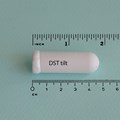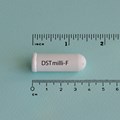DST compass magnetic
Compass, Tilt (3D), Temperature and Depth Archival Tag
Small, long life archival magnetic tag measuring compass, tilt, temperature and depth. Multiple sensors in small sized tag.
For long term fish tagging studies, this is one of a kind tag due to its measuring capabilities, with a compass sensor in addition to tilt, temperature and depth logging.
Key features
- Smallest compass magnetic archival tag on the market
- Various depth sensors, from shallow to deep sea
- Tag holding kit for external fish tagging
- User defined text on the housing
- Description
Smallest compass archival tag on the market
This miniature compass archival tag measures and records earth’s magnetic field strength and tilt in three directions, giving the compass measurements. Additionally it measures depth (pressure) and temperature. The logger is only 46 mm in length and 15 mm in width.
Application
DST magnetic is designed as a fish archival tag for geolocation studies, longitude latitude estimates and migration route tracking of fish and marine animals. It enables scientists to gain valuable information on migration routes and behavioural patterns over a long period of time. The tag can be implanted or tagged externally. For using the logger on a mooring or subsea gear, click here.
Wide selection of depth ranges, from shallow to deep ocean
Customers choose between depth calibration up to: 50 m, 100 m, 270 m, 800 m, 1500 m or 3000 m. The shallower the range the better the resolution and accuracy.
Tag holder kit ensures easier and safer attachment
A tag holder kit is available for the tags, to make the tagging process easier. It also increases the safety for the fish. See more under the accessories tab.
User defined text on the housing
For tag and release of animals into the wild the tags can have a customized text on the housing, for recapture purposes. This is especially important when the tags are used on commercially fished species, so that fishermen can return a tag with valuable data to the scientist. Normally there is a reward for return.
.jpg?w=460&h=345&mode=crop)
.jpg?w=82&h=62&mode=crop)



.jpg?w=120&h=120&mode=crop)

